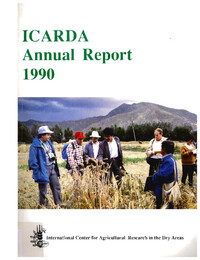ICARDA Annual Report 1990

Authors:
A major service provided by the International Centers affiliated with the Consultative Group on International Agricultural Research (CGIAR) is the collection, conservation, and evaluation of germplasm. The role of the International Center for Agricultural Research in the Dry Areas (ICARDA) is particularly important because its region, West Asia and North Africa, is the center of origin and diversity for all the Center's mandated crops—wheat, barley, chickpea, lentil, and faba bean—as well as a variety of pasture and forage crops.
However, the Center's work in germplasm conservation extends beyond its immediate region. In 1990, ICARDA scientists participated in collection missions to Algeria, Bulgaria, China, Japan, Libya, Morocco, Tunisia, and the USSR, acquiring 6,000 new accessions and bringing the Center's total collection to over 90,000 accessions.
Two of these missions deserve special mention. For the first time in more than 50 years, an international mission that included ICARDA scientists ventured into the highlands of Tibet, where unique and highly stress-resistant barley landraces were collected. Closer to home, ICARDA staff joined Soviet and Syrian colleagues on a collection mission that retraced the steps of Russian pioneer plant geneticist Nicolai I. Vavilov. Unfortunately, this mission confirmed that severe genetic erosion has occurred in recent decades, providing further evidence for the ongoing global effort to conserve our precious genetic heritage for future generations.
